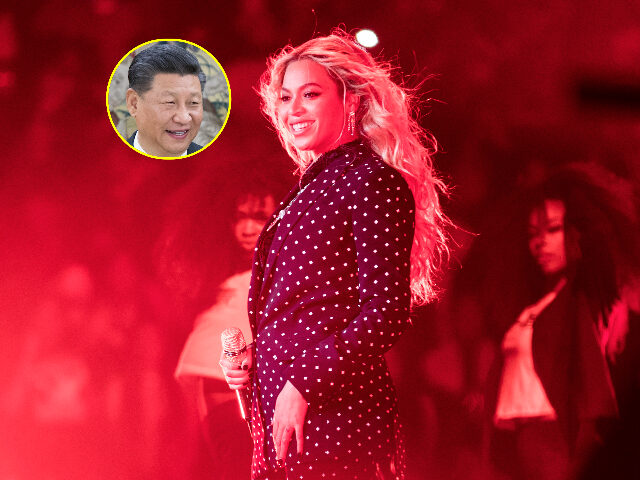China’s Communist Party newspaper the Global Times praised leftist American musician Beyoncé on Tuesday for featuring an outfit designed by a regime-approved Chinese designer and appropriating elements of the Yi ethnic minority’s culture.
Beyoncé reportedly featured an outfit designed by 21-year-old Yuan Qiqi – who the Global Times described as “Chinese,” likely meaning ethnic Han – that appropriated Yi style in her promotional images for her new album, Renaissance. Rather than condemn Beyoncé for being “inspired” by Yi culture without crediting the minority, which faces significant discrimination from regime-friendly rural corporations at home, the Global Times approved of Beyoncé’s use of a designer who told the newspaper that he felt compelled to “protect” what the Communist Party considers Chinese culture.
The Yi ethnic group is native to the southwestern Chinese provinces of Yunnan, Sichuan, and Guizhou, and are a largely rural community with cultural and language similarities to Tibetans and the Burmese. Estimated to number about 9 million people, the Yi , like nearly all ethnic minorities in China, have struggled with discrimination and abuse on the part of Han, regime-approved organizations. Their regions tend to be far less economically prosperous than Han regions, turning many of them into vulnerable migrant workers. The Communist Party has done little to improve the situation of the Yi, instead focusing on subduing anti-regime sentiments within the group.
The Global Times claimed that Beyoncé’s public relations team sought out Yuan, the Chinese designer, after finding a design by him “inspired” by the Yi people.
“In his short career as a fashion designer, Yuan has been inspired by the diverse traditional cultures of China, from the turquoise of the well-known Song Dynasty (960-1279) painting A Thousand Li of Rivers and Mountains and the black of Chinese inkwash landscape paintings to the large shoulder pads of the Yi people,” the Global Times detailed, stating that the outfit Beyoncé wore in the Renaissance promotional images was desgined after Yuan “happened to come across a popular short video on Douyin, China’s TikTok, in which a group of elderly Yi men were wearing traditional clothes.”
The state-run propaganda outlet applauded Yuan for being “socially aware” and feeling a responsibility to promote the Chinese’s government’s Han-centric interpretation of Chinese culture. The Han are the majority ethnic group of China.
“I used to think that I wasn’t qualified to promote what I want to protect because I lacked systematic knowledge about the subject,” Yuan told the Global Times.
Neither the Global Times nor Beyoncé addressed the tense relationship between the Yi and the Han majority that controls the Communist Party. The Yi are often forced by the poverty imposed under communism to seek jobs as migrant workers elsewhere, where they face dangerous workplace conditions and bigotry from regime-connected Han business leaders.

People of the Yi ethnic group take part in a Torch Festival celebration on July 22, 2022 in Bijie, Guizhou Province of China. The festival is observed by many ethnic groups in the province, including the Yi, Bai, Naxi and Pumi. (Photo by Luo Dafu/VCG via Getty Images)
The agencies that hire Yi workers offer them work that “is often poorly paid and lacking valid contracts and legal protection,” Chinese researcher Xinrong Ma wrote in 2019.
“Exposed to yet another set of disadvantages through their precarious work conditions, Yi migrant workers have engaged in acts of visible, organized collective resistance,” Ma wrote. “Instances of this range from street fights to strikes and petitions, and the Yi are generally referred to by the local government as troublemakers. Needless to say, these acts of collective resistance have made local governments increasingly nervous about the presence of Yi migrants in their cities.”
The Global Times focused instead on Yuan, the designer, and his background, noting that Yuan rose to prominence in China after appearing on a talk show wearing a dress and promoting the use of dresses as clothing for boys in 2020 – before the Communist Party banned “sissy men” from television and branded them a risk to “revolutionary culture.”
Dao Insights, a site that offers “Chinese consumer insights,” noted that the Communist Party’s social media cheerleaders “flooded the online space” celebrating Yuan for garnering Beyoncé’s attention and “taking traditional Chinese culture to the global stage.” At press time, however, Beyoncé’s media team has yet to prominently showcase the image in Renaissance‘s promotional material, opting instead for visuals harkening to the American disco era.
Praise from the Chinese Communist Party is the latest in a series of controversies and embarrassments for Beyoncé following the release of Renaissance last month. Shortly after its release, musical artist Kelis accused Beyoncé of plagiarizing “Get Along with You,” a song Kelis released in 1999, in the Reinassance track “Energy.”
“The level of disrespect and utter ignorance of all 3 parties involved is astounding,” Kelis denounced, referring to the two songwriters on “Energy” in addition to Beyoncé. “I heard about this the same way everyone else did. Nothing is ever as it seems, some of the people in this business have no soul or integrity and they have everyone fooled.”
“It’s not a collab it’s theft,” Kelis protested.
Beyoncé also faced widespread condemnation from online leftists over the use of the term “spazz,” which some consider an offensive word for individuals suffering from spastic muscle conditions, in the song “Heated.” Unlike the Kelis controversy, Beyoncé did respond to the outcry over the lyric “spazzin’ on that ass,” promising to rewrite it.
Leftist activists have not, at press time, condemned Beyoncé for culturally appropriating Yi culture. Despite widespread agreement on the left that cultural appropriation – the misuse of cultural elements by someone who does not belong to that culture’s community – is immoral, Beyoncé escaped similar condemnation for similarly lifting foreign cultures in the promotion of her 2016 album Lemonade. Following a legally dubious, regime-approved visit to communist Cuba in 2016, Beyoncé appeared in a video for her song “Hold Up” dressed as the Yoruba deity Ochún, using visuals taken from traditional Cuban santería. Santería, or the Lukumí faith, is a uniquely Cuban adaptation of Nigerian paganism; Cuban santeros worship Ochún syncretized as Our Lady of Charity, an iteration of the Virgin Mary that serves as the patroness saint of Cuba.
Beyoncé has never publicly condemned the repressive Castro regime and, while financially benefitting from the use of santería, has not spoken against the violent repression of santero priests on the island. Among the most prominent cases that Beyoncé has ignored is that of the Association of Free Yorubas of Cuba, who choose to worship outside of the confines of the atheist Communist Party mandates. The Free Yorubas participated in the July 11, 2021, protests against communism, resulting in the mass arrest of their entire leadership. Leader Loreto Hernández García was sentenced to seven years in prison for peacefully protesting the regime. As of last year, Hernández was facing “critical health” conditions in prison with little access to medical care.
Following her regime-approved visit to the island in 2013, Beyoncé said she was “shocked” by criticism against her.

COMMENTS
Please let us know if you're having issues with commenting.